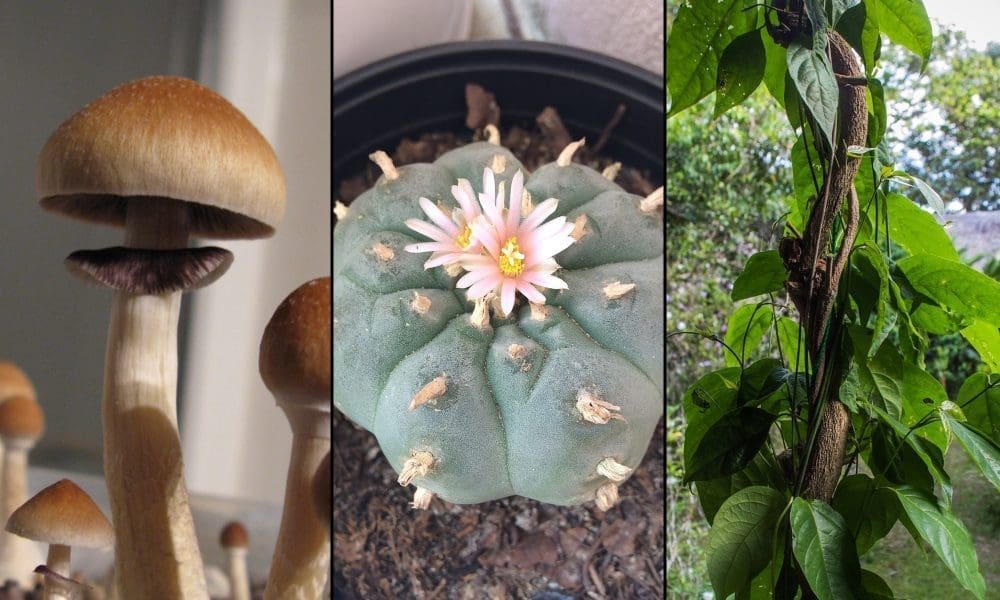A Nevada legislative committee has passed a psychedelic pilot program bill that would allow some patients with certain medical conditions to legally access substances such as psilocybin, DMT, ibogaine and mescaline.
Members of the Assembly Committee on Health and Human Services advanced the measure, AB 378 from Assemblymember Max Carter (D), on a voice vote on Friday. If enacted, the program would allow the medically supervised use of psychedelics among military veterans and first responders with certain mental health conditions.
The bill’s findings section states that “providing access to treatments that involve the administration of psychedelic substances, under proper medical supervision, may contribute to the public welfare by fostering enhanced treatment outcomes.”
Before approving the legislation, the panel adopted an amendment from sponsor Carter and the state Department of Health and Human Services (DHHS) that made a number of changes to the program.
Most notably, the amendment broadens veteran eligibility by substituting “general discharge” for “honorably discharged.” It also empowers DHHS, which would regulate the program, to form an advisory panel that would make recommendations and provide quarterly reports.
Assemblymember Ken Gray (R) said ahead of the vote that while he was on board with passing the amended bill, he wanted to work with the sponsor to ensure that eligible veterans were “put out of the service because of conduct related to their PTSD.”
“Some of our worst PTSD victims have got…less-than-honorable, other-than-honorable and bad-conduct discharges,” he said. “A lot of those guys were put out of the service because of conduct related to their PTSD, and those are some of the guys that need this treatment the most.”
“I’ll vote to get it out of here today,” Gray continued, “but I want to work with the sponsors of the bill to just make sure it’s people discharged from the military with the diagnosis of PTSD.”
The amendment also inserts language shielding DHHS and its employees from liability, stating that they “do not warrant or guarantee the success, safety or any particular outcome of alternative therapy provided under the program,” according to a staff explanation.
The amended bill further requires the Division of Public and Behavioral Health (DPBH), which would administer the program, to create continuing care plans for patients following participation in psychedelic therapy. It also authorizes DPBH to be reimbursed for inspection and certification of various aspects of the pilot program.
The panel took public testimony on the bill late last month, hearing from reform advocates, veterans and their families and members of a state Psychedelic Medicines Working Group, which late last year called on lawmakers to establish a system for regulated access.
Carter, the bill’s sponsor, also shared at the earlier hearing about how psychedelic therapy—involving ketamine, which is not part of the current proposal—helped him overcome “profound, deep grief, treatment-resistant depression” and complex post-traumatic stress disorder after the traumatic death of his wife.
He explained that the pilot program would focus on first responders and military veterans because “those are demographics that everybody can identify with, but more importantly, they’re ones with accelerated—or exacerbated—suicide rates.”
“When we come back here in two years,” Carter told colleagues, “my belief is this will be mainstream therapy.”
Notably, no public commenters spoke in opposition to the proposal, nor did any offer neutral comments.
Under the plan, the state would establish an Alternative Therapy Pilot Program under the Department of Health and Human Services (HHS).
The Division of Public and Behavioral Health under HHS would be tasked with licensing at least one person to “cultivate, manufacture or otherwise produce psychedelic substances for use in the Program,” the bill text says.
Asked at last month’s hearing whether that meant HHS would be expected to actually cultivate mushrooms, Kate Cotter—a member of the state psychedelics working group and the executive director of the Nevada Coalition for Psychedelic Medicines—said that while state cultivation is written into the bill “in theory,” that route “would probably not be very viable.”
“It would be more likely that we would be going through a private sponsor or an academic institution, with somebody who already has a DEA license,” Cotter replied. “It’s written so that it can be cultivated or manufactured, most likely it would be manufactured.”
Another member of the state Psychedelic Medicines Working Group, retired police Lt. Diane Goldstein—who is now executive director of the advocacy group Law Enforcement Action Partnership (LEAP)—told the committee at the earlier hearing that the working group “reached one unassailable conclusion: We must act urgently to begin utilizing these innovative therapeutic approaches.”
“Research presented reflected that nearly 25 percent of all Nevada adults experienced mental illness in the past year, well above the national average,” she said. “Our state suicide rate is ninth highest in the nation.”
Like other speakers, Goldstein noted that harms are especially acute among military veterans and first responder communities, who would be eligible for the measure’s pilot program.
“For too long, we have allowed stigma surrounding both mental health and psychedelics to compound this crisis on all levels. In light of our working groups report, we can now say with certainty that this is a false and unnecessary choice,” she said. “By establishing a strictly regulated pilot program to give military veterans and first responders controlled access to psychedelics, AB 378 would promote the safe use and continued research into these promising treatments.”
While the psychedelic substances are currently prohibited under state and federal law, the measure would make anyone authorized by the division to participate in the program “immune from civil, criminal and administrative liability arising from that conduct and any such conduct must not constitute the basis for any investigation, detention, search, seizure, arrest, prosecution or other legal penalty against the person.”
Carter, the measure’s sponsor, was among several Nevada legislators who participated in a recent psychedelic policy summit and expressed optimism that the state could make progress toward legalizing therapeutic use of the substances in the coming year.
Carter appeared with Sen. Rochelle Nguyen (D) on the panel, hosted by the Nevada Coalition for Psychedelic Medicines. Both lawmakers were members of the state Psychedelic Medicines Working Group that in December issued a report calling on the legislature to create a program for regulated access to psychedelic-assisted therapy.
Last month, meanwhile, Nevada senators took up a joint resolution from Nguyen urging Congress to reschedule certain psychedelics, streamline research and provide protections for individuals using the substances in compliance with state law.
The Senate Legislative Operations and Elections Committee discussed the resolution and took testimony from experts in the field.
“It is very much a grassroots, bipartisan issue. It is a Nevada issue,” Nguyen said in opening remarks. “This is such an important issue. And this may seem like it’s an innocuous [resolution] where we’re sending a letter, but it is super important that we as a state send a message to the federal government—send a message to Washington, D.C.—that we need to start helping our community.”
The resolution lays out research demonstrating the therapeutic potential of psychedelics in the treatment of serious mental health conditions and calls on the federal government to “reschedule psilocybin, psilocin, DMT, ibogaine, mescaline and MDMA to a schedule that better reflects the therapeutic value, low potential for abuse and safety for use under medical supervision of those compounds.”
It also notes that there have been federal developments on the issue, including the Food and Drug Administration (FDA) designation of certain psychedelics as “breakthrough therapies” and research that’s being funded to explore the substances at the Department of Defense (DOD) and U.S. Department of Veterans Affairs (VA).
The purpose of SJR 10 is to “encourage Congress to do their job and put every state on track to allow folks to access these lifesaving therapies,” Nguyen said.
In 2023, Nguyen sponsored legislation that would have legalized psilocybin and promoted further research into the drug, as well as encouraged studies of MDMA—but the was significantly scaled back in a Senate committee to examine the use of entheogens “in medicinal, therapeutic, and improved wellness” and develop a future plan for regulated access. It ultimately became the vehicle that created the state psychedelics working group.
Photo elements courtesy of carlosemmaskype and Apollo.
Marijuana Moment Read More


